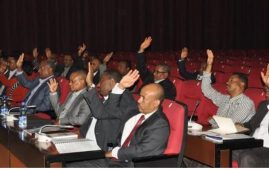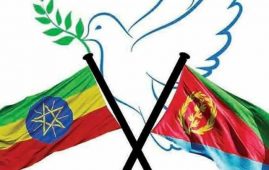(by Solomon Dersso)
On Friday 21 September 2012 Hailemariam Desalegn, Ethiopia’s acting prime minister since Meles Zenawi’s death last month, will be sworn into office. He was elected as chairperson of the ruling Ethiopian Peoples’ Revolutionary Democratic Front (EPRDF) on Saturday.
The surprise, if any, has been Education Minister Demeke Mekonnen’s rise to the position of deputy prime minister. He has been the major unknown factor. In some measure, Demeke’s rise is of course not entirely a surprise. During the EPRDF congress held in Adama in 2010, Demeke ran against Hailemariam for the position of deputy chair. Although the context has changed, what happened over the weekend is a repeat of the events at Adama. Nevertheless, given what the position of deputy chair of the ruling coalition signals for the future, it is significant that it did not turn out to be as contentious as widely predicted.
In many ways, the election of Hailemariam and his deputy is remarkable. Both of them never participated in the armed struggle that brought down the military regime and installed the EPRDF into power. While Hailemariam is a Protestant and hails from one of the minority groups in the south, Demeke is a Muslim. Historically, the leadership of the country is closely associated with Orthodox Christianity and the highland Amhara-Tigre culture. Although the transfer of power took place within the ruling establishment and in the context of Meles’ untimely death, this is the first peaceful handover in the modern history of the country. Notably it also came against the background of predictions of tension and even violence due to a possible power struggle in replacing Meles.
What happened over the weekend is a very sensible thing, if only for settling fears both within the country and in the Horn and East African region. After all, conditions are not optimal for the country to be placed in a position of uncertainty.
Unavoidably, the smooth power transfer has triggered a debate about possible consequences and the impact on the status quo. Employing the prism of politics as a zero-sum game, minds are focused on identifying losers and winners. However, this way of looking at politics is not without its dangers, as it nurtures a mindset that precludes compromise and negotiation, both arts that are central to healthy pluralist politics.
Understandably, there are also strong voices highlighting the emergence of a dichotomised power dynamic involving on-stage and backstage power holders. Some claimed that real power was held by people behind the scenes, not by the new leadership. But this kind of analysis underestimates the amount of power that the ‘on-stage’ actors wield by the mere fact of assuming the highest executive authority in the country.
Here it might be useful to cite the instructive example of Daniel Arap Moi’s rise to power in Kenya. Like Hailemariam, Moi came from one of the smaller ethnic groups in Kenya. Wikipedia makes the interesting statement that, ‘as a member of a minority tribe, Moi was also an acceptable compromise for the major tribes’. Similarly, as Hailemariam was deputy to the late Meles, Moi was also deputy to Kenya’s Jomo Kenyata. The parallel between them does not end here. Like Hailemariam, although he became president of Kenya upon Kenyata’s demise, in the early stages of his rule Moi was not in a position to fully assert his authority. However, during Moi’s rule the presidency assumed such prominence that it came to be both imperial and absolute. The lesson from this is clear: it is not accurate to dismiss Hailemariam as having no real power. The extent to which he will assert his authority is a function of his leadership style. In any case, as the example of Moi illustrates, this is something that may come with time.
The outcome of the weekend`s election is certainly a welcome development and a good beginning. But much more important is what happens next, since the road ahead is arduous, first for EPRDF as the body in leadership and second for all Ethiopians.
On the domestic front, numerous issues must be addressed. The major ones include the widening of the political space, including adopting and tolerating a culture of robust debate, contestation and criticism; practising inclusive and accommodative policy-making, which should include a willingness to listen to the concerns of any section of society; revisiting and repudiating laws inimical to political liberties and freedoms; resolving and mending the fractured relations that parts of the country and sections of society have with the centre through regional autonomy and institutional independence; removing practices that hinder the free movement of capital and labour across the different regions of the country; refraining from practices that frustrate the emergence of credible opposition politics; aggressively fighting the corruption afflicting some parts of government at both federal and regional level; severing the affinity of the security institutions with the ruling coalition; and winning the support of people outside the support base of the ruling coalition through ensuring equal economic opportunities.
Some of these issues are crucial and cannot be postponed indefinitely. The analogy of a festering wound is very instructive here. Unless cured soon, such a wound becomes poisonous and fatal. This is key if the progress the country has made under Meles is to be sustained.
In the sphere of foreign policy, the country should stay the course of supporting initiatives for peace and security in the region. The goodwill the country has earned in the region and on the continent should be wisely maintained and employed. Clarity about the country’s national and security interests is important. The Ethiopian government should communicate these interests properly and defend them unapologetically while remaining sensitive to the concerns of its neighbours. It should continue to negotiate cautiously and responsibly the region’s complex political terrain while building alliances in the region and beyond. It should maintain its political will and make use of its military capability to take responsibility for the promotion of peace and security in the sub-region and beyond. Beyond the political sphere, deepening economic cooperation and implementing economic integration projects with neighbouring countries are equally crucial.
The global economic architecture tends to constrain the efforts of countries like Ethiopia to pursue and achieve indigenous economic development. It is important to remain vigilant against such pressure, whatever the pretext. While investing in sustaining and widening the growth path of the country, including through supporting and harnessing private domestic investment and creating the conditions for more FDI by deepening ties with both old and emerging global powers, the country should continue to resist bullying from any corner.
As significant as it is, what happened over the weekend can be compared to a small stream beside the giant Abay (Nile) River. Seen in the greater scheme of things, what is to come over t
he months and years ahead is much more important. This period will determine whether Ethiopia continues on a sustainable development path and remains a force of stability in a troubled region.
********************
* Originally published by Institute of Security Studies, on Sept. 20, 2012, titled “The Arduous Road Ahead for Ethiopia’s New Leader”, authored by Solomon Dersso – ISS Conflict Prevention and Risk Analysis Division.
Check the Hailemariam Desalegne archive for related posts.





